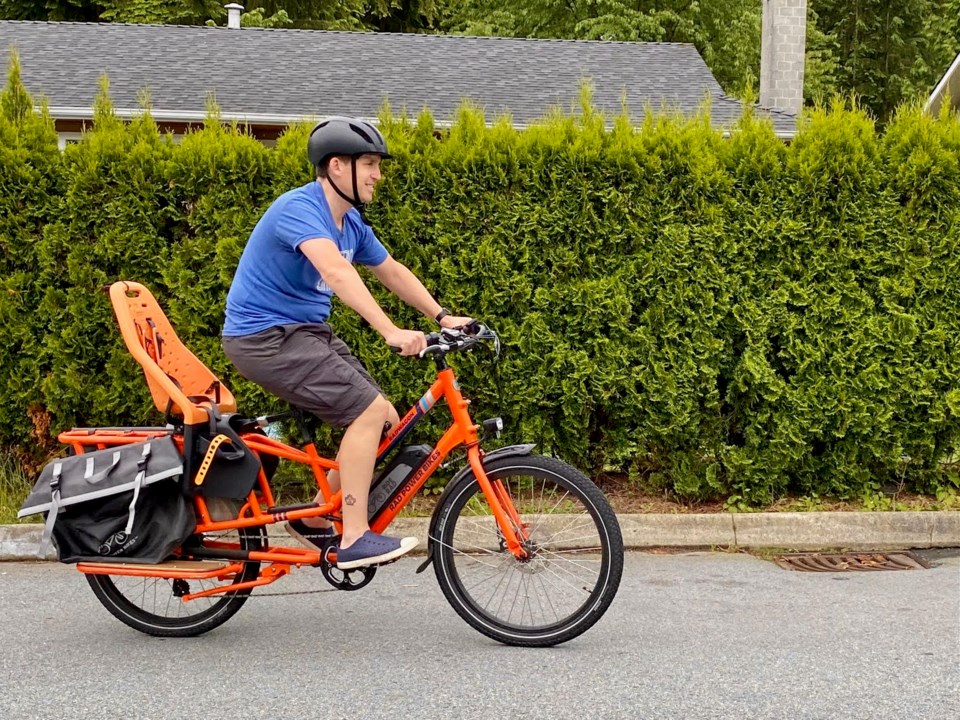The District of North Vancouver voted Monday night to move ahead with a look into an e-bike incentive program for the region.
Tabled to council by Coun. Jordan Back, the e-bike incentive would take its cues from a similar program introduced just last month in Saanich, B.C.
The proposed program would be available to up to 300 participants, with incentives ranging from $350 to $1,600, means tested to household size and income.
Back presented the motion by telling council about his personal experience using an e-bike – he had commuted to downtown Vancouver by car for more than 10 years, but transitioned to active commuting around two years ago.
“Now I commute 50 to 60 per cent of the time [by e-bike] ... with about a 36-kilometre round trip commute. And I have to say that the transition was really not all that hard to make, and it's allowed me to replace about 6,000 km of what otherwise were car trips,” he said.
Back said there are a number of significant benefits to implementing an incentive program, including a decrease in vehicular emissions and increase in people’s health, as he and his fellow councillors look for ways to ease traffic congestion around the North Shore.
“We have to look at every idea. I think that [e-bikes] could be part of the solution. We've contributed to the millions of dollars, well over $200 million, in the Lower Lynn Highway interchange projects. We continue to advocate, now as the North Shore sub region, for much needed rapid transit to the North Shore,” he said. “These are all important and I just think e-bikes are another layer that can help to get people moving again.”
However, when discussing the proposed study, Coun. Betty Forbes brought up a few concerns, namely the district’s ongoing bike-share pilot program with Lime Bikes.
“It's a two-year pilot, with the idea when we put that in it was to go the two years and then assess, look at how the bikes function in our community, how much people either enjoyed them or didn't enjoy them,” she said. “So I think this is sort of ‘putting the cart before the horse,’ and we should wait for the results of a report from the Lime pilot before we go any further.”
Forbes made note that while she is not “against active transportation,” she believes greenhouse gas emissions from internal combustion vehicles can be sooner solved with electric vehicles than e-bikes.
“I think what happens when you get into these e-bike conversations, is you forget about the electric car convert that can be on the road as well, and you solve your GHG issues and people who need to use cars can still use a car,” she said.
Mayor Mike Little and Coun. Lisa Muri both questioned the timing of the study, suggesting staff at the district are overwhelmed with major projects already on the go. Little also questioned the necessity of an incentive program, considering bikes are already “selling like crazy” in the region.
Couns. Megan Curren and Mathew Bond both suggested an e-bike incentive is just one tool that can be used in the district to meet the challenges of the climate crisis and traffic congestion in the area.
However, Curren made note of the “inadequate bike infrastructure” that continues to be a barrier for commuters to switch to active transport.
“I just want to make it clear that I understand that it's not just that bikes are expensive, it's that we also don't have safe infrastructure for riding,” she said. “Because the planning has always benefited and favoured cars. And as we look to the 21st century, we need to look to shifting modes, both in active transportation, and then certainly transit.”
The motion was passed four to three, with Little, Muri and Forbes voting against. A feasibility report from the district’s staff will be released at a later date.
Charlie Carey is the North Shore News’ Indigenous and civic affairs reporter. This reporting beat is made possible by the Local Journalism Initiative.



